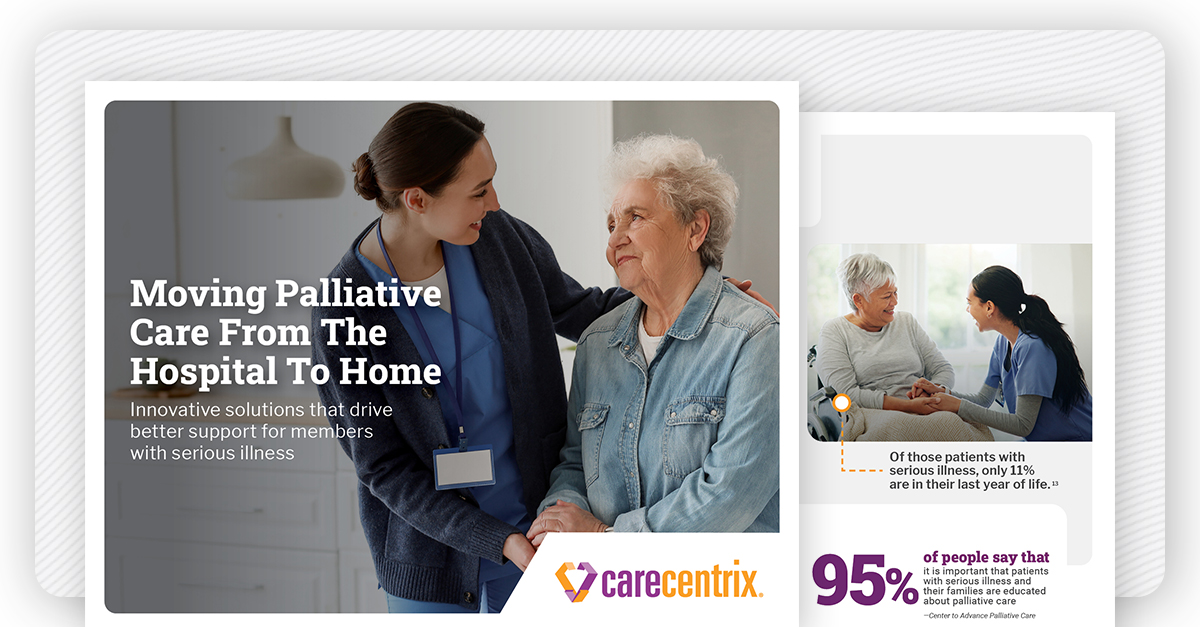Family Caregivers: How Palliative Care Can Help
Facing a serious illness is overwhelming for patients, their family members, and caregivers alike. Between learning about the…
Moving Palliative Care from the Hospital to Home
Payors are constantly looking for ways to enhance the member experience, improve care quality, and reduce costs. One…
Defining Vulnerable Populations in Healthcare
Defining Vulnerable Populations in Healthcare As providers, health plans, and industry stakeholders continue to look at ways to…
4 Healthcare Trends that MA Plans Should Know in 2023
This year will be one marked by significant change and challenges as Medicare Advantage (MA) plans grapple with…
The Caregiving Crisis: How Health Plans Can Help
Over the course of my career caring for and developing programs for people with serious illness, I have…
Building a Better Model for Care at Home
Critical Success Factors in Care Management for Building a Better Care Model for Seriously Ill Patients Living at…
COVID-19 Vaccine is Welcome News for Home-Based Palliative Care Clinicians
The FDA approval of COVID-19 vaccines is welcomed and offers home-based palliative care clinicians much-needed hope during a challenging time. These hard-working professionals have dealt with limited in-home visits for seriously ill patients while working to prevent hospitalizations, support advance care planning, provide relief to caregivers and ensure that patients have food, medications and social contact — while keeping themselves and their own families safe.
Managing Breathlessness in Persons with COVID-19
Our Quick Guide to Treating Dyspnea with Opioids provides a concise evidence review of how opioids relieve dyspnea, includes recommendations for starting doses and titration, describes the role of anxiolytics such as lorazepam and answers the question “do opioids hasten death?” (the answer is no).
Optimizing the Value of Medicare’s Supplemental Benefits
Expanded MA supplemental benefits are largely tied to CMS’s updated guidance allowing plans to cover anything that has “a reasonable expectation” of improving or maintaining the well-being of beneficiaries with chronic conditions.
Enhancing the Role of Case Managers to Resolve SDoH
When case managers partner with a structured community-based palliative care (CBPC) solution, they gain a set of “eyes and ears” into the homes of members struggling with a serious illness, resulting in better care coordination and better outcomes for members and their families.
Medicare Advantage Expansion Foreshadows Growth of Home-Based Palliative Care Population Health Solutions
As the nation’s senior population booms, and more of them turn to Medicare Advantage (MA) plans for coverage, expect growing reliance on home-based population health palliative care solutions, especially now that CMS has approved coverage of supplemental benefits.
Social Determinants of Health: Critical for Improving Patient Care, Quality of Life
The traditional one-size-fits-all benefits strategy is facing a new era of complexity with 2018 finalized guidance and policies from the Centers for Medicare & Medicaid Services (CMS) enabling Medicare Advantage (MA) programs to expand the supplemental benefits1 afforded to beneficiaries.







